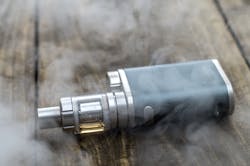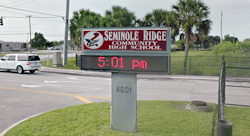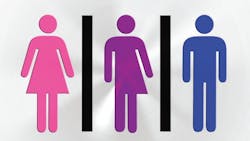Sniffing out vapers
Vaping by students continues to be a problem at many schools across the nation, and bathrooms are where vapers are likely to indulge.
Federal data from the 2022 National Youth Tobacco Survey show that about 1 in 10 or more than 2.5 million U.S. middle and high school students had used e-cigarettes in the past 30-days: 14.1% (2.14 million) of high school students and 3.3% (380,000) of middle school students.
Nearly 85% of vaping students used flavored e-cigarettes, with fruit flavors being the most popular. The popularity of flavored e-cigarettes remains despite federal efforts to curtail their availability. The Food and Drug Administration has banned flavored vaping products derived from tobacco, but many users have turned to synthetic nicotine products.
To combat in-school vaping, many districts have been installing vape detectors in washrooms. The devices can detect vaping particles in the air, and some systems can be connected to school computer networks and notify administrators when offending chemicals are identified. The detectors can be combined with cameras set up outside bathrooms to monitor who went in and out during the time an alert was generated.
Many schools have been able to pay for their detection systems with money received from settlement of a class-action lawsuit in which school systems accused JUUL Labs of using deceptive marketing strategies to lure young people to use their vaping products.
Students need IDs to use bathrooms at Florida high school
Students at Seminole Ridge High School in Loxahatchee, Fla., will be required to scan their ID with a teacher and leave their backpack behind when they use the bathrooms during class time.
The Palm Beach Post reports that under the new policy imposed by principal Robert Hatcher, teachers will be stationed outside certain restrooms during class time with a laptop and a student ID scanner. Before entering, students must scan their ID with the teacher and leave their backpack outside.
The teacher will be able to review any items students are bringing into the bathroom, such as tampons or makeup. The teacher will submit an online form that shows the student used the bathroom. the policy also allows no more than four students in the bathroom at a time.
"Controlling access to student restrooms is a proactive measure," Hatcher says. "We feel that we are enhancing safety by monitoring and providing supervision during times when students would normally be in class." "
Hatcher stressed that none of the school's 2,264 students will be prevented from using a bathroom when needed.
Arkansas bans transgender students from using school bathrooms matching their gender identity
Arkansas Gov. Sarah Huckabee Sanders has signed a law prohibiting transgender people at public schools from using restrooms that matches their gender identity,
CBS News reports that the law makes Arkansas the fourth state to place such restrictions at public schools. The legislation, which takes later this summer, applies to multiperson restrooms and locker rooms at public schools and charter schools serving prekindergarten through 12th grade.
Similar laws have been enacted in Alabama, Oklahoma and Tennessee.
The Arkansas law requires schools to provide reasonable accommodations, including single-person restrooms. Superintendents, principals and teachers who violate the prohibition could face fines, and parents could also file private lawsuits to enforce the measure.
Opponents have also complained the legislation doesn't provide funding for schools that may need to build single-person restrooms to provide reasonable accommodations.
About the Author
Mike Kennedy
Senior Editor
Mike Kennedy has been writing about education for American School & University since 1999. He also has reported on schools and other topics for The Chicago Tribune, The Kansas City Star, The Kansas City Times and City News Bureau of Chicago. He is a graduate of Michigan State University.


